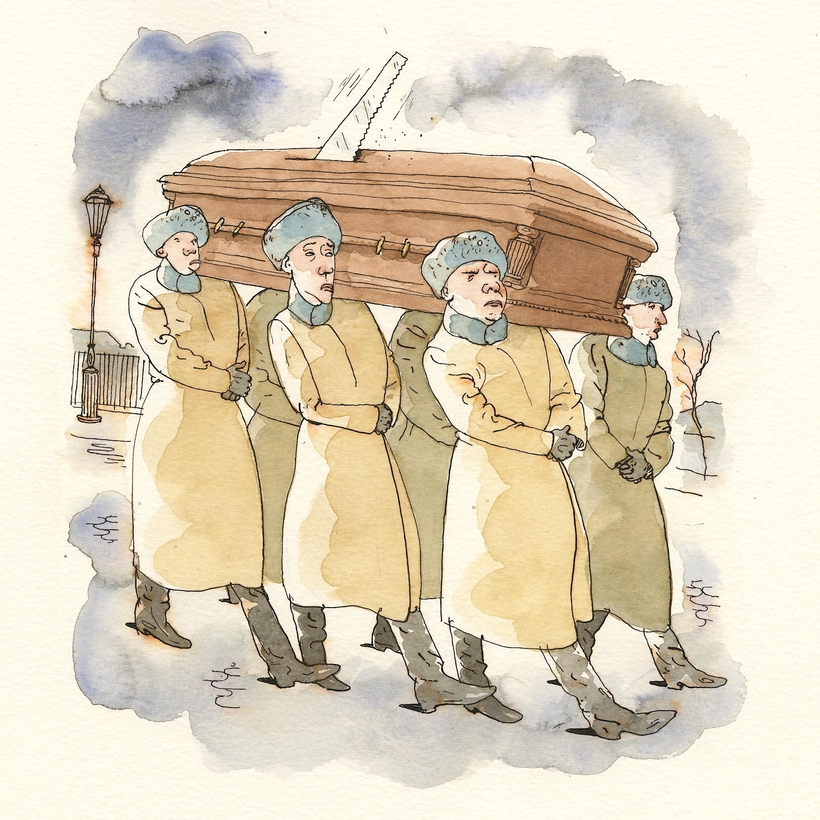The danger is all too real: you’re standing on the 16th floor of a tower block in St. Petersburg, lingering slightly too close to a window, when blammo, unbidden and apropos of nothing, you plunge to your gory death. As happened last week to Marina Yankina, a key figure in funding Putin’s war in Ukraine. And to Pavel Antonov, the wealthiest deputy of the Russian Duma, in December. And to oil tycoon Ravil Maganov, last September. When outspoken mercenary chief Yevgeny Prigozhin lashed out at the Russian Ministry of Defense this week, one feared that he, too, might be positioned dangerously close to a casement.
But the latest flurry of mysterious deaths of Russian V.I.P.’s—oligarchs, pro-Kremlin editors, senior Lukoil officials, Russian sausage kings—is not confined to foolhardy window lingerers and balcony fetishists. Some of the loyal Russians who have succumbed in recent months are people who have taken the bold and ill-advised initiative to use the stairs (Who needs polonium when you have hard, concrete stairwells?), go to a restaurant (“What’s that new flavor in the borscht?”), or get on a boat (“Alone, alone, all, all alo…”).
Lest the population dwindle to dangerous lows, herewith some helpful suggestions for those Russians who insist on tempting fate by leaving the house daily.
Weapons of self-defense
While Tasers, pepper sprays, and stun batons all have their place in the world of armaments, nothing says “I mean business” quite like a tactical whip. Tactical whips are so old-school that any human antagonist you encounter will be forced to pause simply to marvel at your old-timey audacity. Indeed, never did the 300-pound former Mossad agent who’s been chasing you through the Moscow subway think that he would come face-to-face with that most inexorable opponent, Barbara Stanwyck with a piece of rawhide.
On the water
The decks of boats are notoriously slippery. One minute you’re admiring the coquettish way that sunlight dapples the surf, the next you’re on the bottom of the ocean with two 100-pound barbells duct-taped to your torso. Should an associate of yours suggest you travel together by boat, simply announce that instead you’ll travel separately; then arrive on a tommy gun–mounted Zodiac inflatable raft bearing a collection of slightly rusted spearfishing equipment. The tone is set.
Alternatively: Have you considered even more solitary and recherché forms of aquatic travel? No henchman has ever come within 50 feet of a surfboard or paddleboard. Yes, comrade, the concessions we must make in order to continue breathing are grim: it is time to get tubular.
Disguises
As we know from Keri Russell and Matthew Rhys on The Americans, no person is identifiable to any of his associates once that person has put on a hairpiece. Invest in wigs; let your storage closet become a humidor of hair.
One minute you’re admiring the coquettish way that sunlight dapples the surf, the next you’re on the bottom of the ocean with two 100-pound barbells duct-taped to your torso.
The next hurdle is a nose. The two most successful directions here are the Gérard Depardieu (bulbous, earthy) and the Adrien Brody (needle-like, questing). Lest you look like someone with a piece of squashy latex glued onto his face, it is incumbent upon you to augment your new nose with compatible behavior—the Depardieu demands a rough sensuality given to bear hugs and a tendency to plunge one’s fingers deep into the rich loam of the earth; the Brody wants discernment and a predilection for weeping at the opera. No one knows you when you’re not you.
Obi/Kamali
If you happen to have any facility for style, you may be able to pull off wearing an obi, the wide swath of fabric that keeps a kimono closed. Your obi will be a parachute—the only object in the world capable of giving you peace of mind when you find yourself rapidly plunging past the 23rd floor of the Kotelnicheskaya Embankment Building from the outside.
Even more audaciously, you might consider wearing your parachute: the designer Norma Kamali has, since the mid-70s, been designing clothes made of parachute nylon. Such a garment could save your life. Equip your Kamali with a hidden spinnaker. Then practice casually saying, “That’s not my drop seat, Yuri—that’s my rip cord.”
One last caveat
Of all the precautions that might be taken to ensure a long and prosperous life during dangerous times, there is one whose efficacy does not outweigh its moral burden. We speak of the habit, reportedly adopted by Nazi generals late in the war, of harboring a cyanide capsule up your anus. Such a measure cannot be recommended. It creates a pinched disposition and a telltale tightness around the mouth.
Henry Alford is a New York–based writer and the author of And Then We Danced


